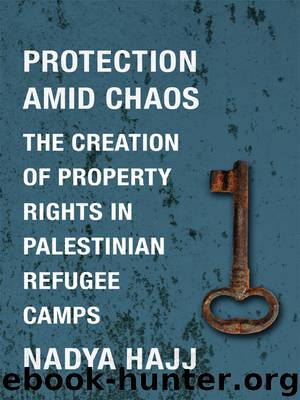Protection Amid Chaos by Nadya Hajj

Author:Nadya Hajj
Language: eng
Format: epub
Tags: POL035010, Political Science/Political Freedom & Security/Human Rights, HIS026000, History/Middle East/General
Publisher: Columbia University Press
Published: 2016-12-19T16:00:00+00:00
PALESTINIAN REFUGEES NEGOTIATE TITLE FORMALIZATION
After Fatah established authority through the Cairo Accords in 1969 and built CC offices, Palestinian communities were pushed to negotiate the formalization of property rights with Fatah’s new ruling coalition. The CC offices were local gathering spots for the negotiation of formal property rights. Negotiations were an ongoing process involving a series of accumulated micro-level encounters between Fatah and different refugee community members like business associations, unions, and smaller political parties. Interestingly, though Fatah was dominant in the CCs, it limited or shackled its own power to expropriate title contracts through a voting system that gave each local political party a voice on issues of dispute. CC members consulted with one another and voted in the event of a property title dispute. Decisions were based on simple majority votes, though the CC sought consultative compromise on every issue (I-58L). In effect, the CC voting system served as a form of checks and balances that limited the power of Fatah and enforced contracts for all members of the camps, not just some members. Refugees from the camps had different perspectives on Fatah and inclinations about how to preserve assets and protect the community from predation. On one hand, many businesses and everyday residents were excited about Fatah and its revolutionary agenda. On the other hand, religious sheiks felt it was important to insulate the community’s affairs from Fatah’s elite politics in order to protect the community.
For example, refugee businesses had a big stake in the formalization of property rights. Once CCs were set up, businesses finally had a meeting place to talk about their needs regarding the protection of their assets. These small business entrepreneurs had more invested inside the camps than most residents and would see the most returns on investments with the construction of a formal property rights system that protected their assets. For example, businesses in the refugee camps in Lebanon had an average of four full-time workers and mostly conducted business inside the refugee camps or in nearby villages (from questions A2 and A3 on the background of construction businesses in appendix B). A number of businesses attended property rights negotiations at CC offices, including businesses in the carpentry, iron, steel, tile, cement, and glass-making subsectors.
In order to assess the motives of refugee businessmen, I primarily relied on survey data conducted in 2007 and in-depth interview data collected in 2004. Three questions in the survey focused specifically on the goals of businessmen as they sought to craft property rights. First, I asked businessmen if they primarily wanted to create property rights that facilitated long-distance business transactions. Indeed, most refugees wanted property rights that would facilitate long-distance transactions. Second, I asked businessmen if they desired rules that made it easier to do business with not only friends or family, but also with strangers. Not surprisingly, refugees wanted to overcome the challenges of refugee camp isolation. They desired a system that let them connect to individuals and companies outside the camps. Finally, refugee businessmen were
Download
This site does not store any files on its server. We only index and link to content provided by other sites. Please contact the content providers to delete copyright contents if any and email us, we'll remove relevant links or contents immediately.
The Brazilian Economy since the Great Financial Crisis of 20072008 by Philip Arestis Carolina Troncoso Baltar & Daniela Magalhães Prates(133693)
International Integration of the Brazilian Economy by Elias C. Grivoyannis(108511)
The Art of Coaching by Elena Aguilar(53172)
Flexible Working by Dale Gemma;(23284)
How to Stop Living Paycheck to Paycheck by Avery Breyer(19685)
The Acquirer's Multiple: How the Billionaire Contrarians of Deep Value Beat the Market by Tobias Carlisle(12308)
Thinking, Fast and Slow by Kahneman Daniel(12222)
The Radium Girls by Kate Moore(12012)
The Art of Thinking Clearly by Rolf Dobelli(10414)
Hit Refresh by Satya Nadella(9118)
The Compound Effect by Darren Hardy(8919)
Tools of Titans by Timothy Ferriss(8361)
Atomic Habits: Tiny Changes, Remarkable Results by James Clear(8319)
Turbulence by E. J. Noyes(8040)
A Court of Wings and Ruin by Sarah J. Maas(7809)
Change Your Questions, Change Your Life by Marilee Adams(7733)
Nudge - Improving Decisions about Health, Wealth, and Happiness by Thaler Sunstein(7689)
How to Be a Bawse: A Guide to Conquering Life by Lilly Singh(7464)
Win Bigly by Scott Adams(7183)
